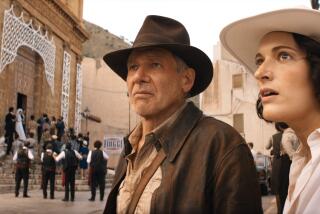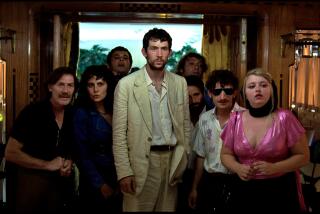Outsiders’ WWII from the inside
- Share via
This has been an exceptional year for the unexpected World War II film, for motion pictures that combine the traditional satisfactions of combat movies with the bracing bite of contemporary relevance.
In addition to the Clint Eastwood diptych of “Flags of Our Fathers” and the upcoming “Letters From Iwo Jima,” we now have “Days of Glory.” This remarkable, powerfully entertaining French Moroccan Algerian co-production tells the hidden story of the massive North African troop participation that made possible the ultimate French victory in Europe.
Under its original title of “Indigenes” or “Natives,” the film, Algeria’s entry in this year’s foreign language Oscar race, was perhaps the major surprise at Cannes. It won the best actor award for its four key cast members and ignited a debate about whether France had done right by these soldiers. The result, just two months ago, was a change in government policy bringing foreign combatant pensions into line with what French veterans are paid.
The debate about who feels welcome in today’s France is one of that country’s most pressing. But, as demonstrated by the warmth the four Cannes winners displayed when they broke into a period patriotic song as they accepted their award, “Days of Glory” is hardly a tract. It is above all a film that is feelingly made and steeped in the strongest emotions.
As directed by Rachid Bouchareb, himself born in France to Algerian immigrants, “Days of Glory” is a kind of a North African “Saving Private Ryan,” a taut, involving film that delivers all the things we look for in war movies and does so with intelligence and integrity. What these men are searching for is not any particular soldier but their own honor and sense of themselves.
“Days of Glory” begins in 1943 with the recruitment of the men we will follow. In Algeria, we meet the sad-faced Said, intoxicated by the recruiter’s cry that “we must wash the French flag with our blood” and beautifully played by Jamel Debbouze, a major French comic actor in his first serious role.
In Morocco there is Yassir (Samy Naceri), a Berber in traditional dress who signs up for the money even though the French killed much of his family. “What did they call it?” he’s asked. “Pacification” is the reply.
In Italy the following year, where the North Africans turn out to be critical to the first French victory over the Germans since 1940, we are introduced to marksman Messaoud (Roschdy Zem, last seen in “Le Petit Lieutenant”), who has “no luck” tattooed on his neck.
Finally, there is the bright, idealistic Abdelkader (Sami Bouajila), a corporal who has his eye on higher things but is determined to stand up against the unequal treatment frequently meted out to the North Africans.
These men are under the immediate supervision of Sgt. Martinez (Bernard Blancan), an extremely hard-nosed pied noir, someone of French descent born in North Africa. It is typical of how seriously “Days of Glory” takes its dedication to historical reality that Martinez is a more complicated figure than he at first seems; tougher than month-old gristle toward his men but willing up to a point to plead their case and vouch for their patriotism to his superiors.
Working with screenwriter Olivier Lorelle, director Bouchareb takes these protagonists down three intertwined paths, starting with their stories as individuals. Messaoud, for instance, has a touching romantic encounter with a young French woman, and Said is teased and called Aicha (the name of one of the Prophet’s wives) when he serves as a kind of aide-de-camp for the sergeant.
We also see these men as soldiers, making rookie mistakes, gaining confidence and fighting against considerable odds. The film’s major set piece, the defense of an Alsatian village against a German attack, is as gripping and expertly done an extended action sequence as anyone could want.
At its core, though, “Days of Glory” is concerned with giving these men their due as soldiers who selflessly fought for a France they had never seen, who meant every word when they sang, as the quartet of actors spontaneously did in Cannes, “we come from the colonies to save the motherland, we come from afar to die, we are the men of Africa.”
That determination to record the heroics of the past in order to give dignity to the generations of today and the future keeps “Days of Glory” emotionally honest. Told in a tight, classical style that never overplays its hand, this is a film done the way they used to make them, yet energized with the intensity only the issues of today can provide.
MPAA rating: R for war violence and brief language. Running time: 2 hours. Exclusively at Laemmle’s Monica, 1332 2nd St., Santa Monica (310) 394-9741.
More to Read
Only good movies
Get the Indie Focus newsletter, Mark Olsen's weekly guide to the world of cinema.
You may occasionally receive promotional content from the Los Angeles Times.











